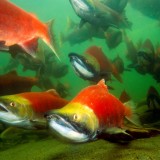According to Otto Langer, the former senior DFO scientist and manager who first blew the whistle on Stephen Harper’s plan to gut the Fisheries Act, the job cuts associated with Harper’s program will soon be taking effect in BC. Langer sent out the following warning on June 27.
Today all DFO habitat protection and management staff in Canada are receiving letters that they are now “red-circled” – i.e. they are being affected by Bill C-38 with it’s budget and habitat legislation and program cuts (i.e. DFO downsizing) and many will soon not have a job. Yesterday all staff in the BC-Yukon region were advised of this happening in a telephone call from Pacific Regional Director General Susan Farlinger. Staff were directed to not discuss this with anyone and only DFO Ottawa was allowed to comment on the issue.
132 habitat staff across Canada will be fired (laid off) in the next few months in that many will have to compete for remaining jobs. In the Pacific Region, they now have 92 staff and that is to be reduced to 60 – an approximate 33% cut in staff. Also, all habitat office locations in Pacific Region are to be closed down, with the exception of Whitehorse, Prince Rupert, Kamloops, Vancouver and Nanaimo. That means offices such as those in Mission, Campbell River, Prince George, Nelson, Williams Lake, Smithers, Port Hardy, etc. are to be shut down. If the Enbridge and natural gas pipelines go across northern BC, there will be no habitat staff in Prince George or Smithers, etc. to respond to potential disasters – the closest offices will be Prince Rupert or Kamloops.
The office in Port Hardy has looked after salmon farming issues, which it will be unable to do now.
This puts DFO back where it was in the early 1980s, i.e. 5 offices in BC and even less staff than they had in 1983 with many giant projects such as Enbridge, gas lines, gas liquification plants, New Prosperity Gold Mine, Site C Dam on the Peace River, Panamax tankers of jet fuel up the Fraser River, Roberts Bank Port expansion, etc. now being proposed and pushed along. Never in the past 50 year history of habitat protection have we seen such great cuts in staff the face of upcoming massive industrial development that can and will harm habitat and our fisheries of the future.
Finally, Ottawa has given all DFO habitat staff directions to remove the “Habitat Management Program” title from their organization and from their offices, etc. in that they are now to be called the “Fisheries Protection Program”.
In summary, this puts DFO back to where they were in the late 1970s in terms of habitat staff numbers in the Pacific Region, but with next to no legislation to protect overall habitat and a greatly reduced presence in the field where the habitat damage takes place. Their efforts will of course be distracted over the next year or more in that staff will have to compete for the surviving 60 positions and put their minds to what they can do for a living when laid off and where they move to to get a job to support their families, etc. I am told the already very low morale of the staff was destroyed by Bill C-38 and now it has received its final blow – the willingness and direction to do their jobs can now be measured in negative quantities.
One can now say that the Harper Government has ‘right-sized’ the workload for the reduced number of staff! They will protect less habitat, despite the incredulous claims of DFO Minister Ashfield and many Conservative MPs that DFO will provide the fishery with better, more focused protection. More staff-related budget cuts have been outlined for 2013 and 2014.
All DFO habitat protection offices from Quebec to the BC-Alberta border, i.e. Central and Arctic Region, will also be drastically cut and all offices will be shut down except in Ottawa, Burlington, Winnipeg, Edmonton and Yellowknife. It is indicated that of 63 DFO offices in Canada with habitat staff (now “fisheries protection” staff), most will be closed and the number of offices having habitat-type program staff will be reduced to 14 for a giant geographic area – i.e. Canada.






